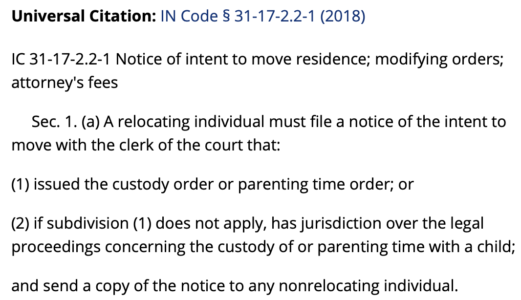What is the Relocation Statute? It is found at Indiana Code § 31-17-2.2-1, and it requires that when either parent under a custody order decides to move, they notify both the court and the other parent of the move in advance. Specifically, the statute holds:

In addition to spelling out the requirements of notice, the statute also provides more details about the timing and contents of the notice. The notice must also meet the following requirements:
- It must be sent to the nonrelocating individual by registered or certified mail no later than ninety (90) days before the intended move;
- It must provide various details about the move, such as the new address and phone number of the residence, reason for the move, etc.;
- It must provide a proposal for a revised schedule of parenting time or grandparent visitation with the parties’ child or children;
- It must provide a statement that the opposing parent must file an objection to the relocation of the child or children with the court not later than sixty days after receipt of the notice;
- And more.
Any parent considering a move would do well to review the statute themselves, or sit down with an experienced family law attorney to walk through the process. If the non-moving parent does decide to challenge the moving parent’s change of location, the court will hold a hearing to make a determination on the matter. It should be noted that a court will not prevent a parent from moving to a new location – every adult (barring exceptional circumstances) has the freedom to move to and live where they please. However, courts are empowered to make decisions in the best interests of children, which could include allowing the moving parent to relocate while ordering the children to stay behind with the opposing party. Whatever the court’s decision, it will be based on an analysis of many key factors in each case (such as the reason for the move, the specifics of the new location, the environment offered by the opposing party, the track history of both parents, etc.). The court’s aim – and its statutory obligation – is to make a decision that is in the best interest of the child.
The fact is, many parents fail to file notice of their relocation, often because they are not aware of the law and its requirements, they do not want to be bothered with the requirement, or they do not want to give such information to the other parent. However, ignoring this rule could have major consequences for the offending parent, which may include receiving warnings from the court, being found in contempt, being ordered to pay the opposing party’s attorney fees if an objection is brought, or even a modification of the parties’ custody order. If you are a parent with a custody order who is considering a move in the near future, you will need to make sure that you comply with these statutory requirements.
NOTE
All legal references are made with respect to Indiana law. Please check the laws of your local jurisdiction if you live in another state.
The articles in this blog are for informational purposes only. No attorney-client relationship is established through the publication of these articles.







